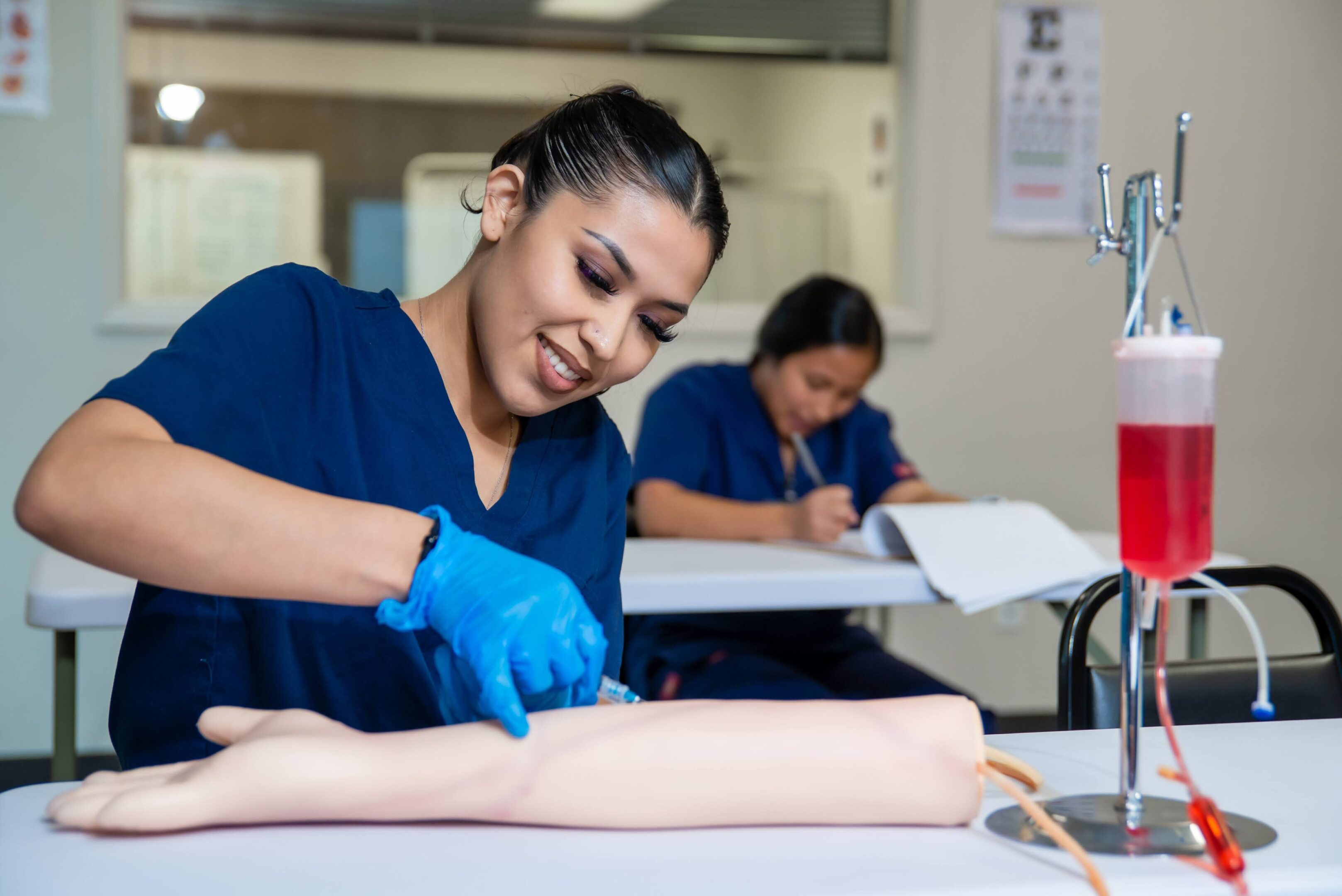
Accelerated Learning Pathways in Healthcare
Kern Valley Medical College offers a wide range of academic programs designed to meet the needs of the medical community. Our curriculum is tailored to provide a robust learning experience that equips students with the knowledge and skills necessary for success.
Diverse Healthcare Programs
Medical Assistant Program
If you have a passion for healthcare and want to make a difference in people's lives, consider enrolling in the Clinical Medical Assisting program at Kern Valley Medical College. This program is designed for individuals who want to enter the healthcare field quickly and effectively. It offers a comprehensive education that equips students with the necessary skills to work alongside physicians and other healthcare professionals.
Overview of the Program
The Clinical Medical Assisting program is a 4.5-month course that provides a thorough understanding of the roles and responsibilities of medical assistants. Students will learn both the administrative and clinical tasks required in various healthcare settings. The program combines classroom instruction with practical, hands-on experience, ensuring that graduates are well-prepared for the workforce.
One of the unique aspects of this program is the 160-hour externship included in the curriculum. This externship allows students to work in a real medical environment, gaining valuable experience and building professional relationships. During this time, students will apply the skills they have learned in class while being supervised by experienced healthcare professionals.
Key Skills You Will Learn
Throughout the Medical Assistant program, students will acquire essential skills that are critical for success in the healthcare field. Here are some of the key skills you will learn:
Record Patient History and Personal Information: Understanding a patient's background is crucial. You will learn how to gather and document important information about patients, which helps healthcare providers make informed decisions.
Measure Vital Signs: Vital signs, such as blood pressure, heart rate, and temperature, are indicators of a person's health. You will be trained to accurately measure these signs to assist in patient assessments.
Assist Physicians During Patient Examinations: Medical assistants play a vital role during examinations. You will learn how to support physicians by preparing patients and ensuring the examination process runs smoothly.
Administer Injections or Medications: With the right training and within state laws, medical assistants can administer certain medications and injections. You will gain hands-on experience in this area, which is essential for many healthcare settings.
Schedule Patient Appointments: Organizing appointments is a key administrative duty. You will learn how to manage schedules effectively, ensuring that patients receive timely care.
Prepare Blood Samples for Laboratory Tests: Understanding how to collect and prepare blood samples is another important skill. This knowledge is vital for conducting various laboratory tests that help diagnose medical conditions.
Set Up Examination Rooms and Manage Medical Instruments: Keeping the examination area organized and ready for use is essential. You will learn how to set up rooms and manage medical instruments efficiently.
Assist in Medical Procedures and Provide Patient Care: Medical assistants often assist in various procedures and play a role in patient care. This training prepares you to support healthcare teams and provide compassionate care to patients.


Career Opportunities
After completing the Clinical Medical Assisting program, graduates can pursue various career paths in the healthcare industry. Medical Assistants are in high demand in hospitals, clinics, private practices, and other healthcare facilities. Some may choose to specialize in specific areas, such as pediatrics, or geriatrics, further expanding their career opportunities.
With the skills and knowledge gained from the program, graduates can confidently enter the workforce and contribute to improving patient care. The healthcare field offers a rewarding career with the potential for growth and advancement, making it an excellent choice for those seeking a meaningful profession.
Enrolling in the Clinical Medical Assisting program at Kern Valley Medical College is the first step toward a fulfilling career in healthcare. With a focus on essential skills, hands-on experience, and a supportive learning environment, this program prepares students to become valuable members of the healthcare team. If you are ready to embark on your journey in the medical field, consider applying to this program and take the first step toward making a difference in the lives of others.
Medical Assistant/Phlebotomy Combination Program
The Medical Assistant/Phlebotomy Combination Program is a comprehensive training course designed for individuals seeking to enter the healthcare field as certified Medical Assistants and licensed Phlebotomists. Spanning a rigorous 6.5 months, this program equips students with essential knowledge and hands-on skills required for success in various medical settings.
Overview of the Program
Throughout the program, students delve into a wide array of subjects that form the foundation of medical assistance and phlebotomy. Key topics covered include human anatomy and physiology, which provide a necessary understanding of the human body, its systems, and how they interact. This foundational knowledge is crucial for any aspiring healthcare professional, as it informs patient care and treatment procedures.
Moreover, the course emphasizes the importance of understanding various practice settings, which range from hospitals to outpatient clinics. Students learn about the ethical standards and regulations that govern medical practices, ensuring that they are prepared to operate within legal and professional boundaries.
Another significant aspect of the curriculum is the "order of draw," an essential concept in phlebotomy that dictates the sequence in which blood samples should be collected to avoid contamination. Mastering this technique, along with venipuncture - a method for drawing blood safely - ensures that students can perform these tasks competently and confidently.
Certification and Licensure
Upon successful completion of this nationally accredited program, students will be eligible to sit for the American Medical Certification Association’s (AMCA)exams, as well as obtain a State Phlebotomy License. Achieving certification not only enhances a graduate's employability but also validates their skills and knowledge in the eyes of potential employers.
Graduates will emerge from the program as certified Medical Assistants and licensed Phlebotomists, ready to embark on careers in a variety of medical specialties. This versatility allows them to work in diverse environments, including hospitals, clinics, laboratories, and private practices.
Admission Requirements
To enroll in the Medical Assistant/Phlebotomy Combination Program, applicants must meet specific criteria:
- Age Requirement: All applicants must be 18 years or older.
- Identification: Applicants must present a State-issued Identification Card, Driver’s License, or Passport.
- Social Security: A valid Social Security Number is required, confirming that the applicant is a U.S. citizen or eligible to work in the United States.
- Education: Proof of High School Graduation or a GED is necessary, or applicants must have a higher degree. For those with diplomas from foreign institutions, an evaluation for U.S. equivalency is needed.
- Background Check: Applicants must not have felony convictions and must meet specific criteria regarding certain misdemeanors, such as drug and theft offenses.
The Medical Assistant/Phlebotomy Combination Program offers a robust educational experience that prepares students for a rewarding healthcare career. By acquiring both technical and interpersonal skills, graduates are well-equipped to meet the demands of the medical field. This program not only provides essential training but also opens doors to various career opportunities, ensuring that students are ready to contribute positively to patient care and the healthcare community at large.
Certified Phlebotomy Technician Course (CPT1)
The role of a Certified Phlebotomy Technician (CPT1) is vital in the healthcare field. Phlebotomy technicians are responsible for drawing blood from patients for various medical tests, transfusions, donations, or research. If you are interested in pursuing a career as a CPT1, this guide outlines the necessary steps to enroll in the Certified Phlebotomy Technician Course (CPT1) and what to expect.
Cost Breakdown
Tuition: $1850
Additional Fees
Before enrolling in the CPT1 course, it is important to consider the associated costs. Here are the fees that students should anticipate:
Uniform Costs: Students will need to purchase uniforms, which typically consist of black scrubs and a white lab coat. Prices can vary based on brands and retailers.
California State CPT1 License Fee: A fee of $100.00 is required to obtain the state license necessary for practicing as a CPT1 in California.
National Certification Exam Fee: After completing the course and externship, students are eligible to take the national certification exam. The fee for this exam is $117.00.


Nurse Assistant Training Program (NATP)
The Nurse Assistant Training Program (NATP) is designed to prepare individuals for a rewarding career in healthcare as Certified Nursing Assistants (CNAs). This program focuses on essential caregiver responsibilities, safety protocols, and adult health care. By completing this training, students will gain the skills and knowledge necessary to provide quality care to patients and will be eligible to take the competency evaluation required for CNA certification.
Requirements for Enrollment
Before enrolling in the Nurse Assistant Training Program, prospective students must meet specific requirements. These requirements ensure that all students are prepared for the challenges of the program and the responsibilities of a CNA.
General Requirements
- Background Check: A criminal background check is mandatory to ensure the safety of patients and compliance with healthcare regulations.
-
Fingerprints: A Live Scan fingerprinting process is used to conduct a thorough background check for criminal history.
-
Valid Identification: A government-issued ID is required to verify the identity of the student.
-
American Heart Association BLS Certification: Students must obtain a Basic Life Support (BLS) card, which provides training in emergency response techniques.
-
Physical Exam: A physical examination is required to confirm that students are in good health and capable of performing job duties
-
Immunizations: Students need to provide proof of required immunizations to protect both themselves and their patients from infectious diseases.
Uniform Requirements:
- Navy blue scrubs
-
Watch with a second hand (no smartwatches)
-
Non-skid closed-toe shoes (black or white only)
-
No Crocs allowed
Overview of the CNA Role
Certified Nursing Assistants play a crucial role in the healthcare system. They assist nurses and other healthcare professionals in providing care to patients. CNAs help with daily living activities such as bathing, dressing, eating, and mobility. They also monitor patients' vital signs, report changes in health status, and ensure a safe and comfortable environment for patients.
The NATP equips students with both theoretical knowledge and practical skills. Students will learn about anatomy, physiology, infection control, and patient rights. They will also receive hands-on training in basic nursing skills, communication techniques, and emergency procedures.
Curriculum Structure
The curriculum of the Nurse Assistant Training Program typically includes the following components:
Classroom Instruction: Students attend lectures and discussions on topics such as patient care techniques, safety protocols, and legal issues in healthcare. This portion of the training helps students understand the theoretical background of nursing assistance.
- Skills Lab: In a controlled environment, students practice essential nursing skills. This hands-on training allows students to develop their proficiency in delivering care and using medical equipment safely.
- Clinical Experience: Students gain real-world experience by working in healthcare settings under the supervision of licensed professionals. This experience is vital for applying learned skills in actual patient care situations.
- Assessment and Evaluation: Throughout the program, students are assessed on their knowledge and skills through written exams, practical demonstrations, and clinical evaluations. This ensures that they meet the standards required for certification.
IV Therapy Certification and Blood Withdrawal
Kern Valley Medical College provides an IV Therapy Certification program, including Blood Withdrawal, that is accredited by the BVNPT. Participants will earn 36 Continuing Education (CE) Contact Hours upon completing the program, which emphasizes intravenous fluid infusion and blood withdrawal techniques.
Topics Covered
The curriculum covers various essential topics, including legal considerations, infection control, venipuncture methods, types of IV fluids, patient monitoring, and safety protocols. To obtain certification, students must successfully perform four blood withdrawals and three IV starts.
Tuition Fee: $700.00
EXPLORE THE CAMPUS
Experience the exceptional facilities at Kern Valley Medical College. With state-of-the-art classrooms, innovative simulation centers, and advanced laboratories, students enjoy an ideal setting for immersive learning and practical experience. Witness the commitment of dedicated students and faculty as they work together to shape the future of healthcare in every class and practice session.


Join the Community
Kern Valley Medical College creates a collaborative atmosphere that encourages students to learn from one another and from seasoned professionals. With an emphasis on accelerated learning, this college serves as a gateway to a fulfilling career in medical services. If you have any questions, feel free to get in touch to discover how they can assist you on your educational journey.
